A Power of Attorney for South Carolina is a legal document or form that allows the principal to choose an agent or attorney-in-fact, to make decisions and handle selected affairs on their behalf.
For example, the principal uses this form to give the agent authority or power regarding finances, health care, or other specified tasks. As a principal, ensure that you sign this document and present it to your agent and other relevant third parties, according to the South Carolina State laws.
You can choose to create a durable POA which guarantees that your agent will retain the given authority even after you become incapacitated or mentally incompetent. That means that you should select a trustworthy agent and will observe their fiduciary duty.
You can use it in different counties within the State. Ensure that your agent has a copy of the form as proof when taking action on your behalf.
Free Forms
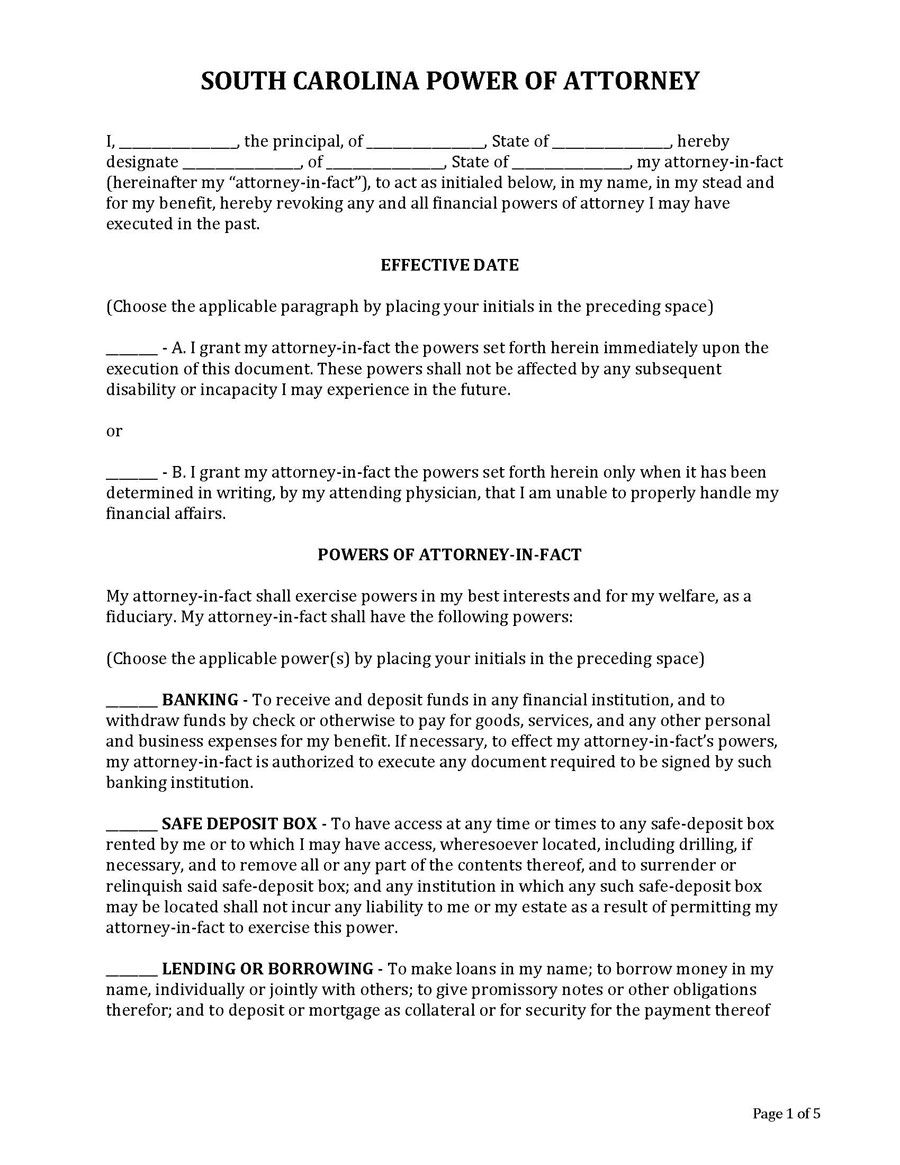
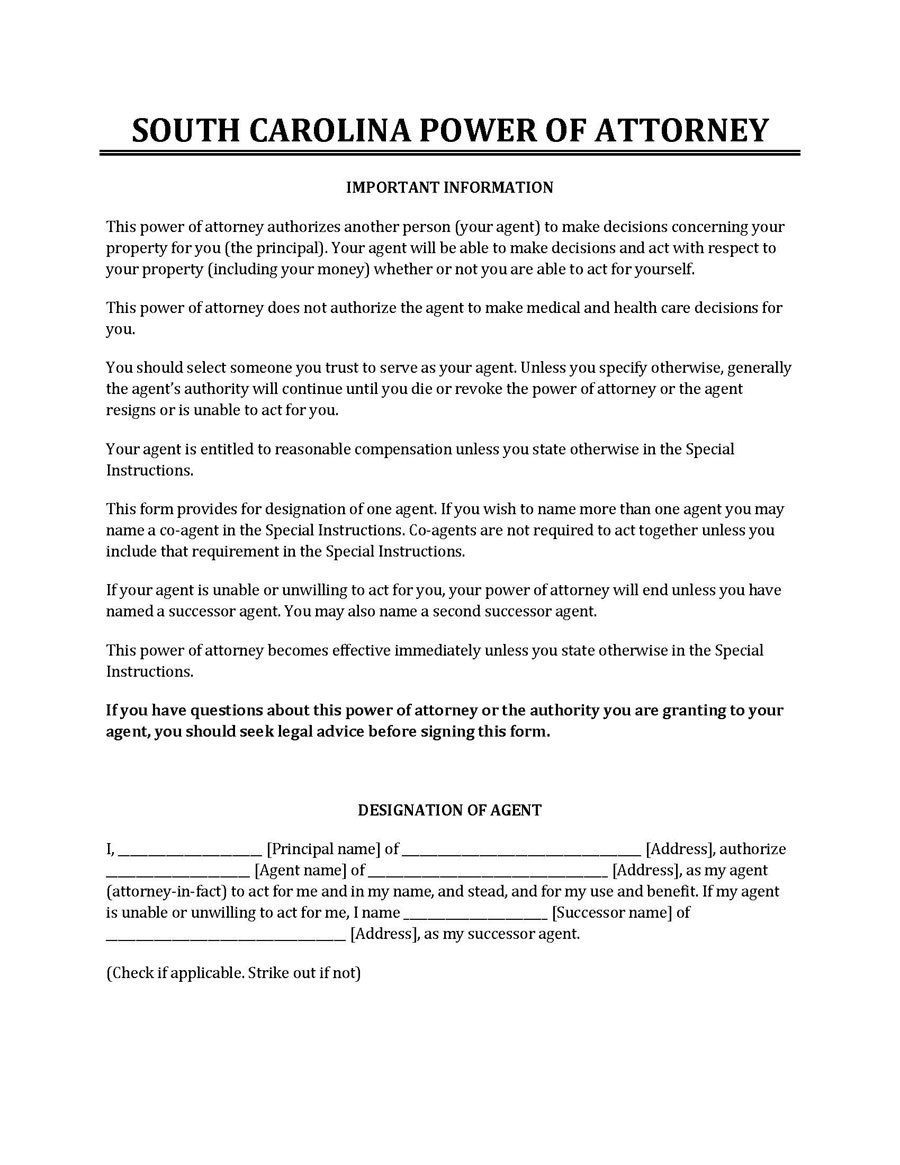
Reasons to Have a POA in South Carolina
As an adult (18 years and over) in South Carolina, you need to have it. Some of the reasons why you need it in SC include: if you are moving into a care facility, if you are traveling to live abroad or out of South Carolina State if you are absent and cannot handle your affairs by yourself, if you are ill, or getting older or if your health is deteriorating.
The 9 Different Types
There are different power of attorney forms that you can use in South Carolina. The types are as follows:
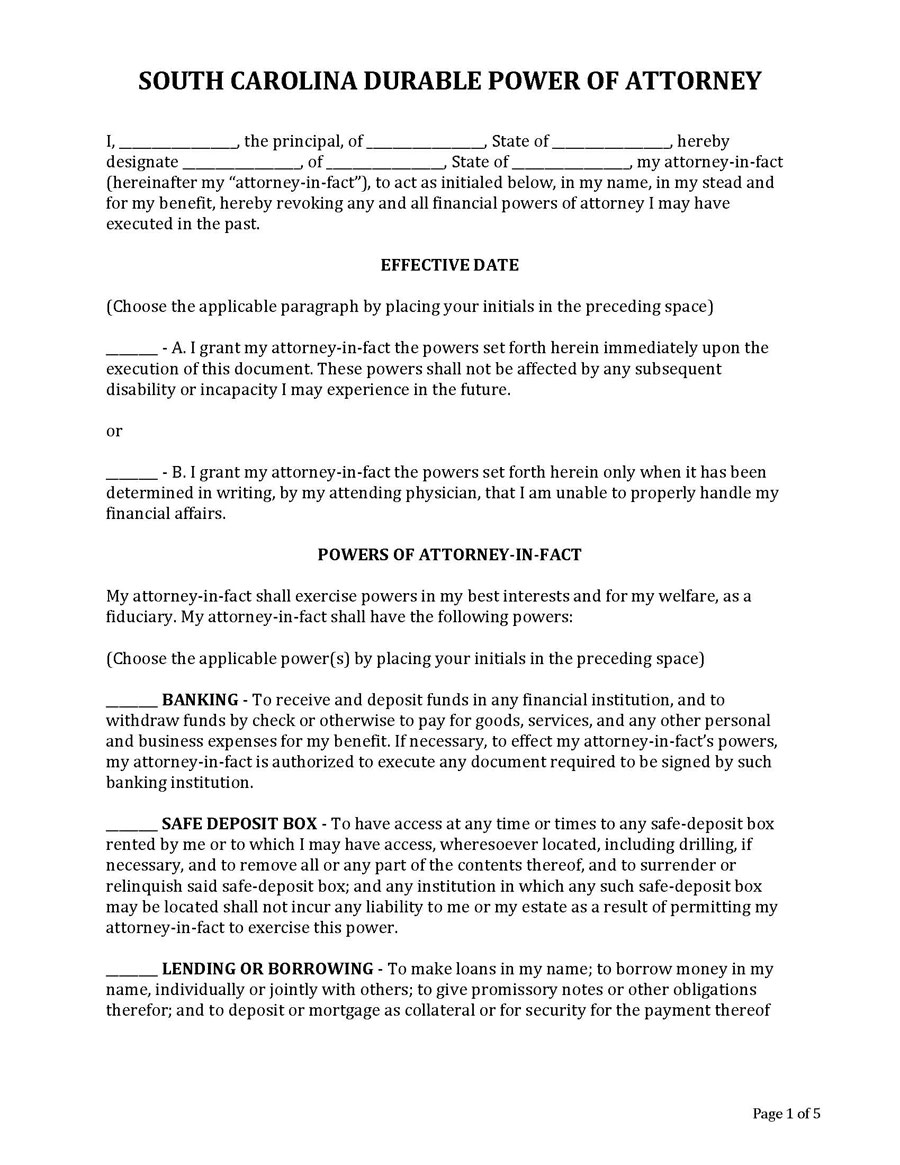
Durable Power of Attorney Form
Download: Microsoft Word (.docx)
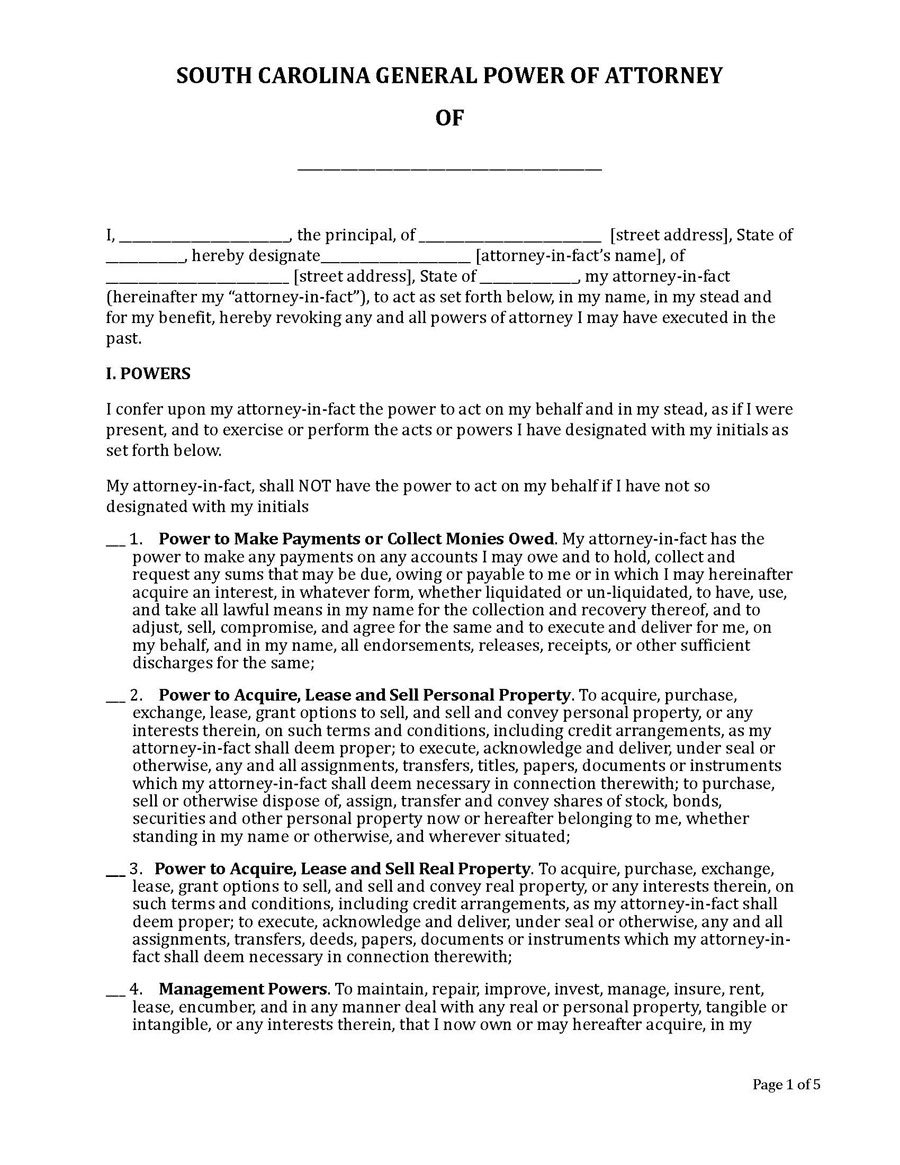
General Power of Attorney Form
Download: Microsoft Word (.docx)
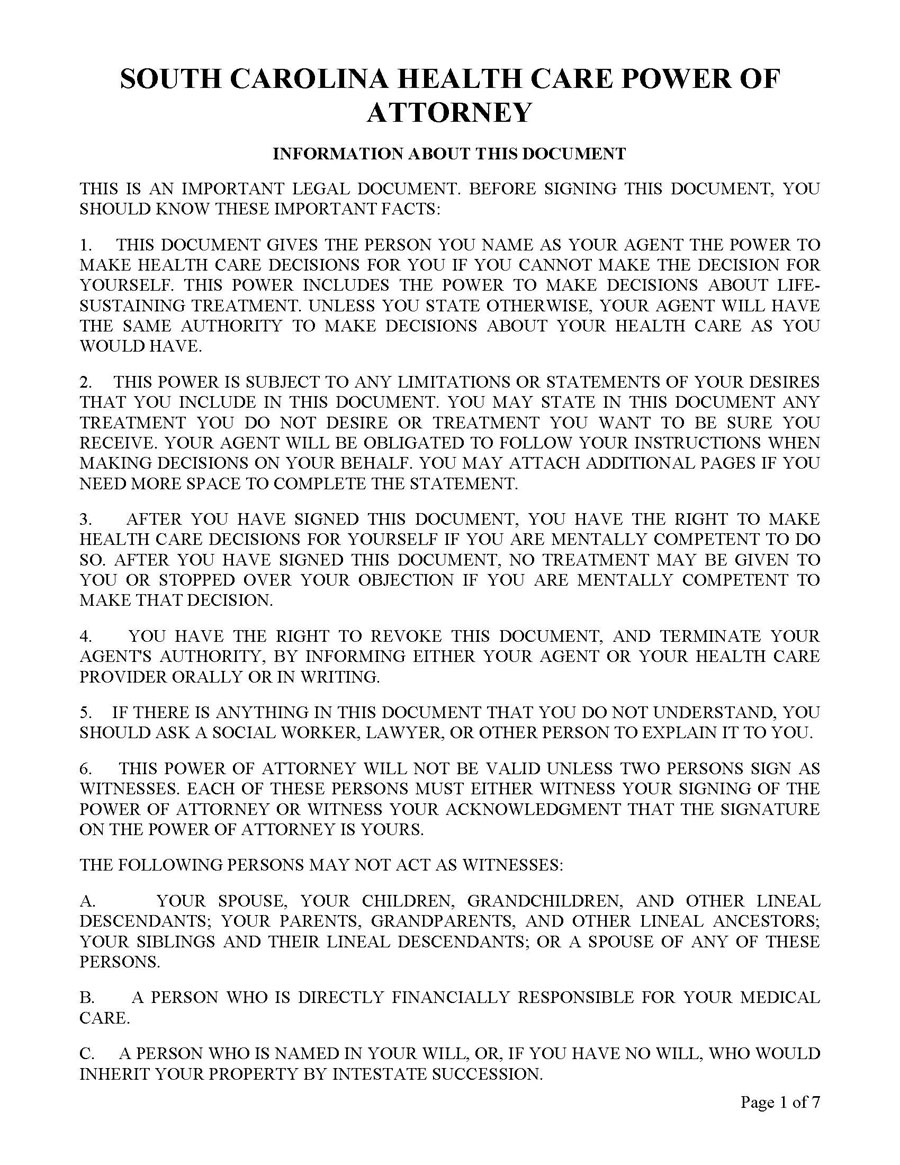
Medical Power of Attorney Form
Download: Microsoft Word (.docx)
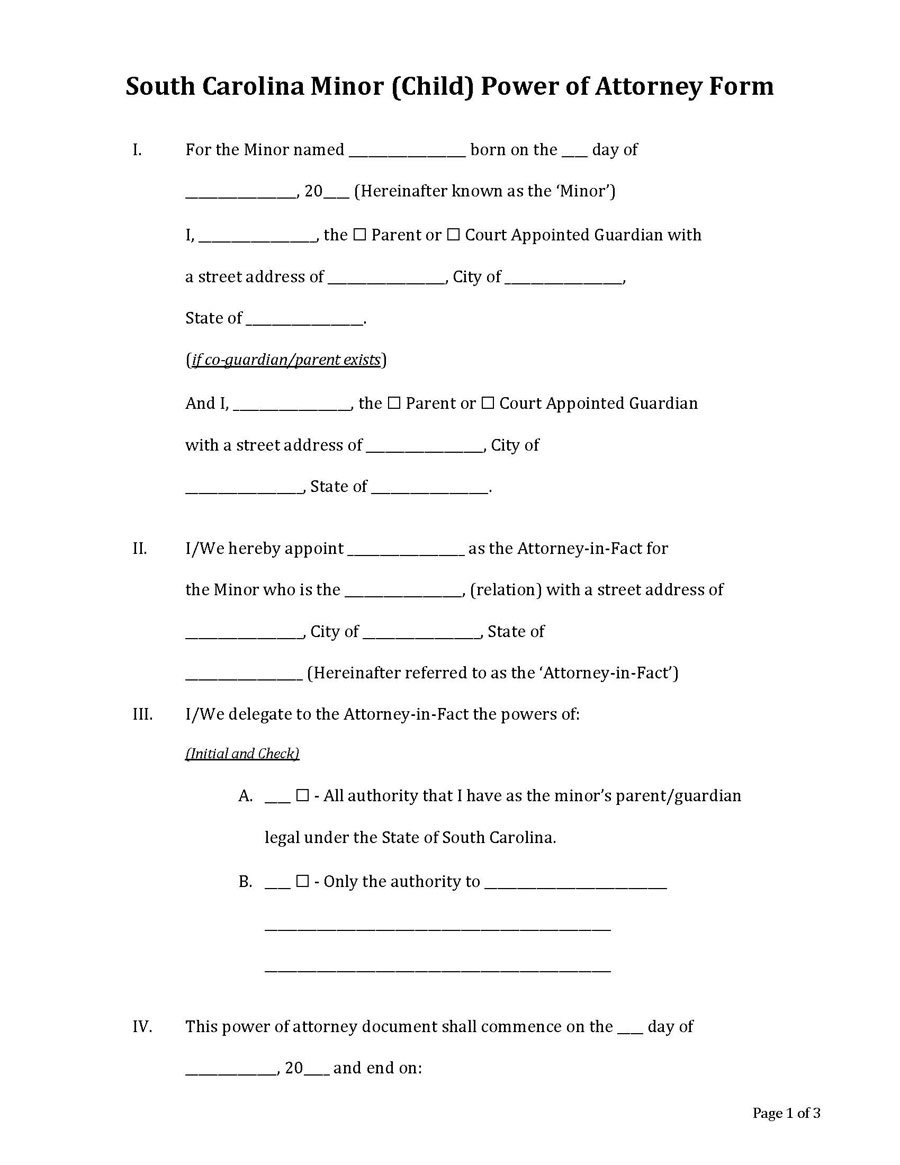
Minor Power of Attorney Form
Download: Microsoft Word (.docx)
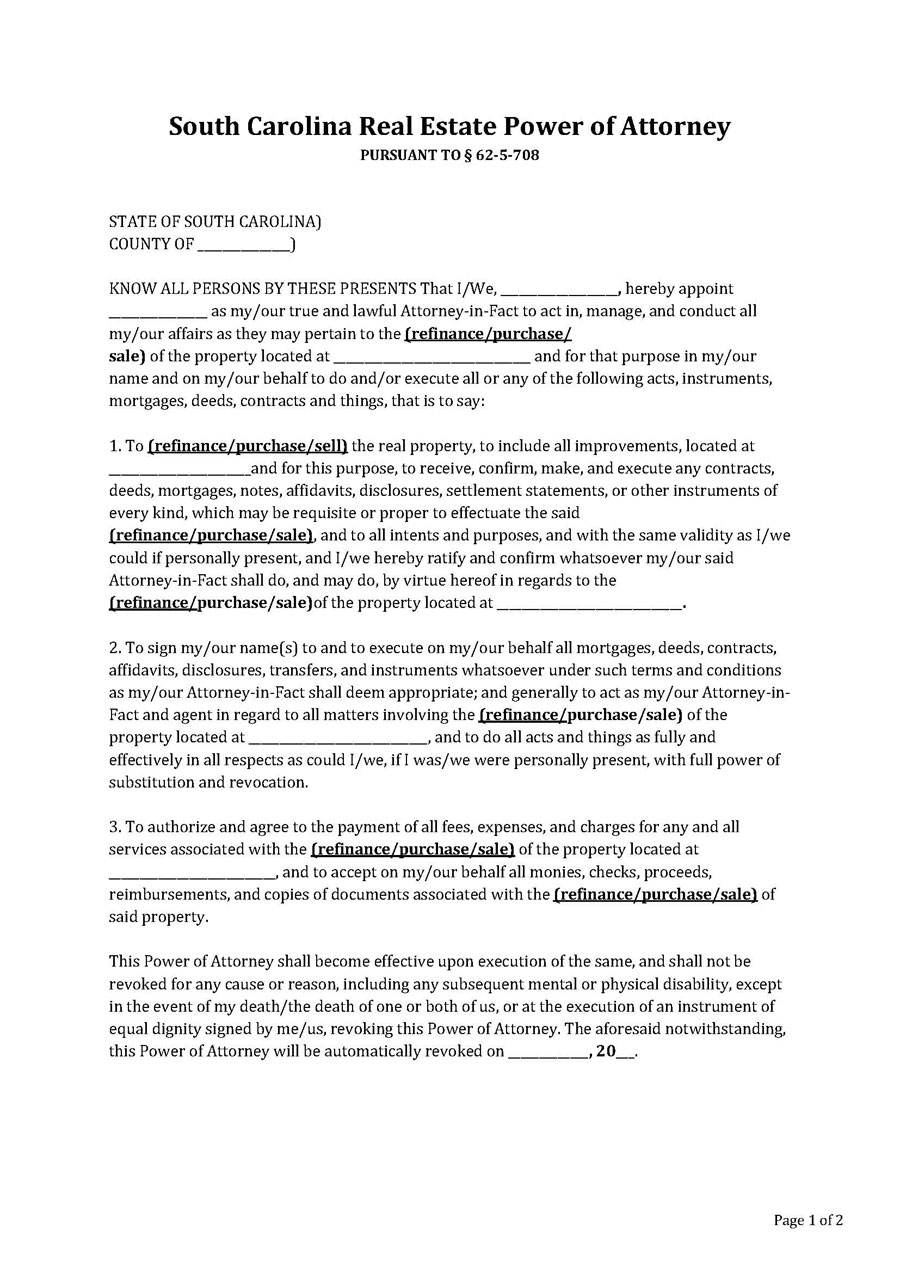
Real Estate Power of Attorney Form
Download: Microsoft Word (.docx)
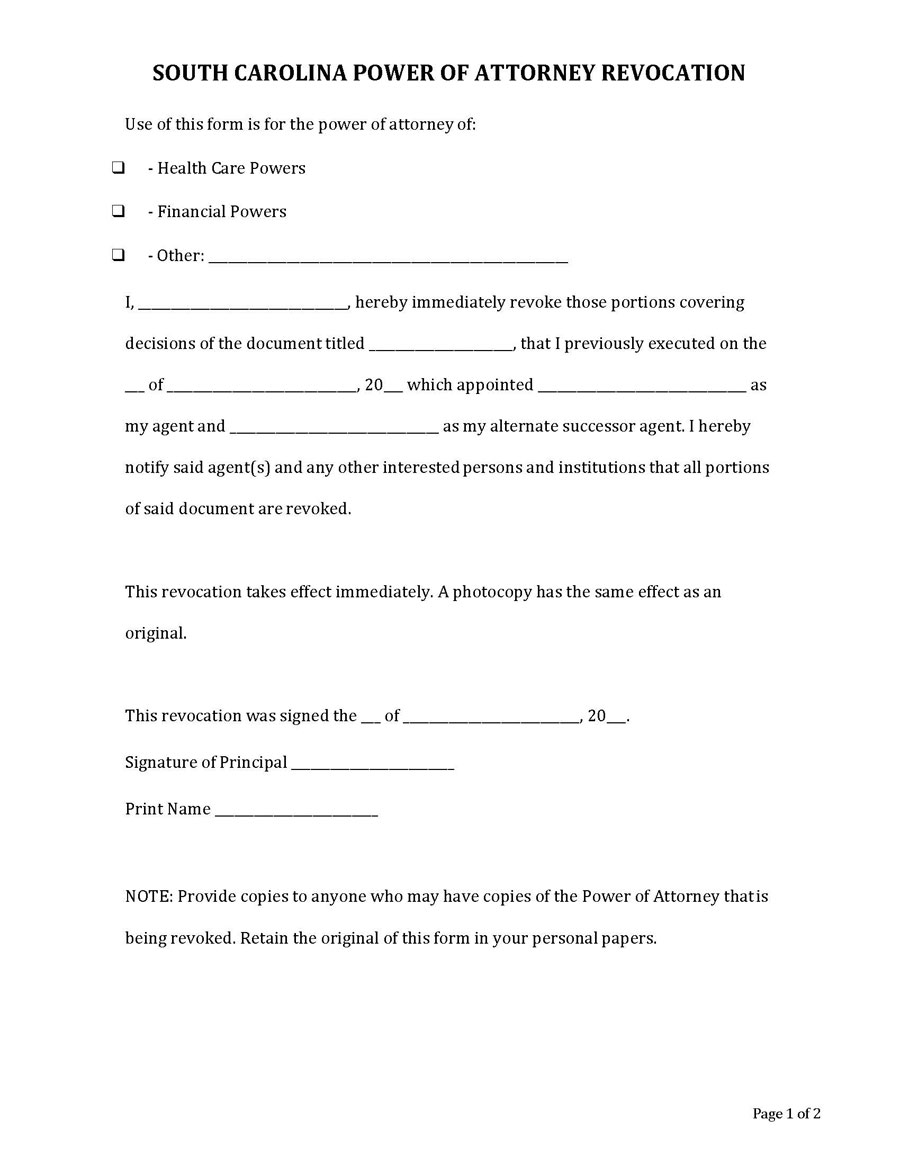
Revocation of Power of Attorney Form
Download: Microsoft Word (.docx)
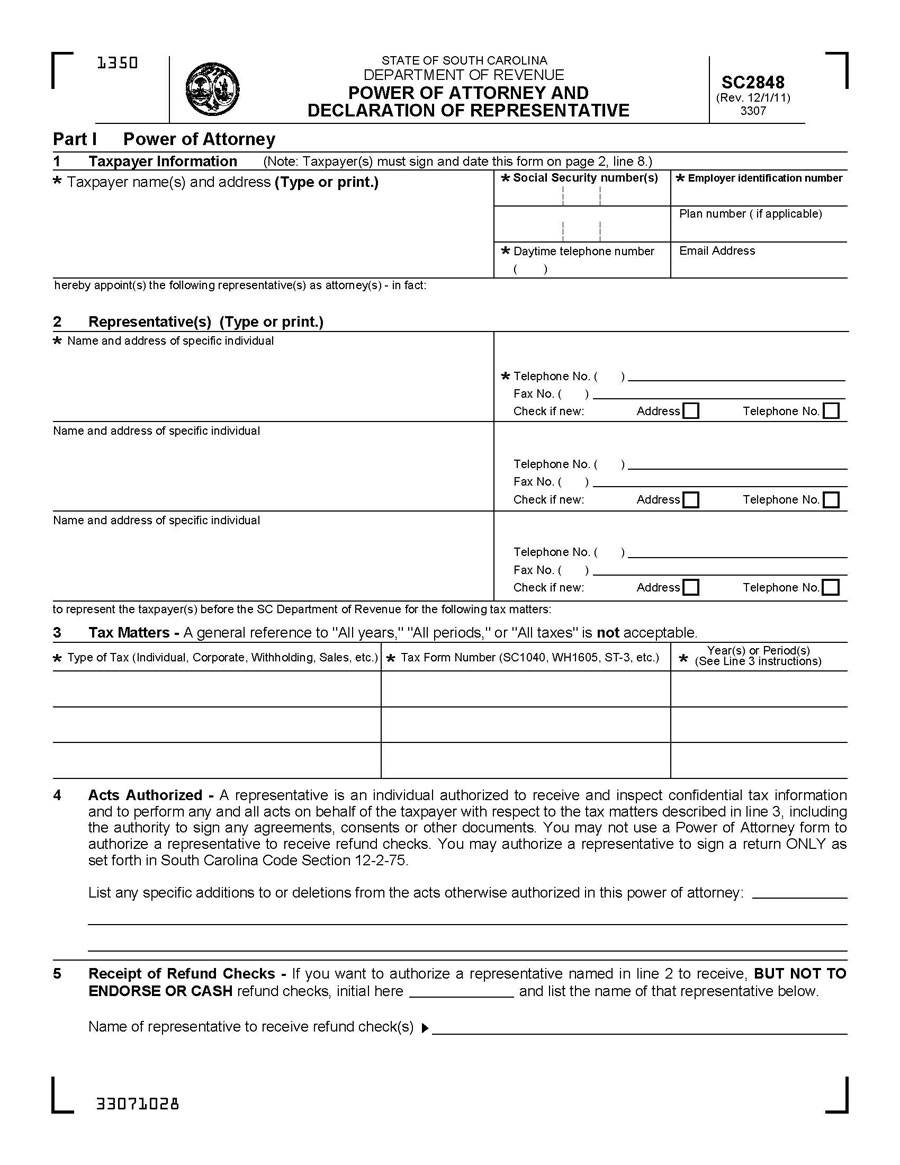
Tax Power of Attorney Form
Download: Microsoft Word (.docx)
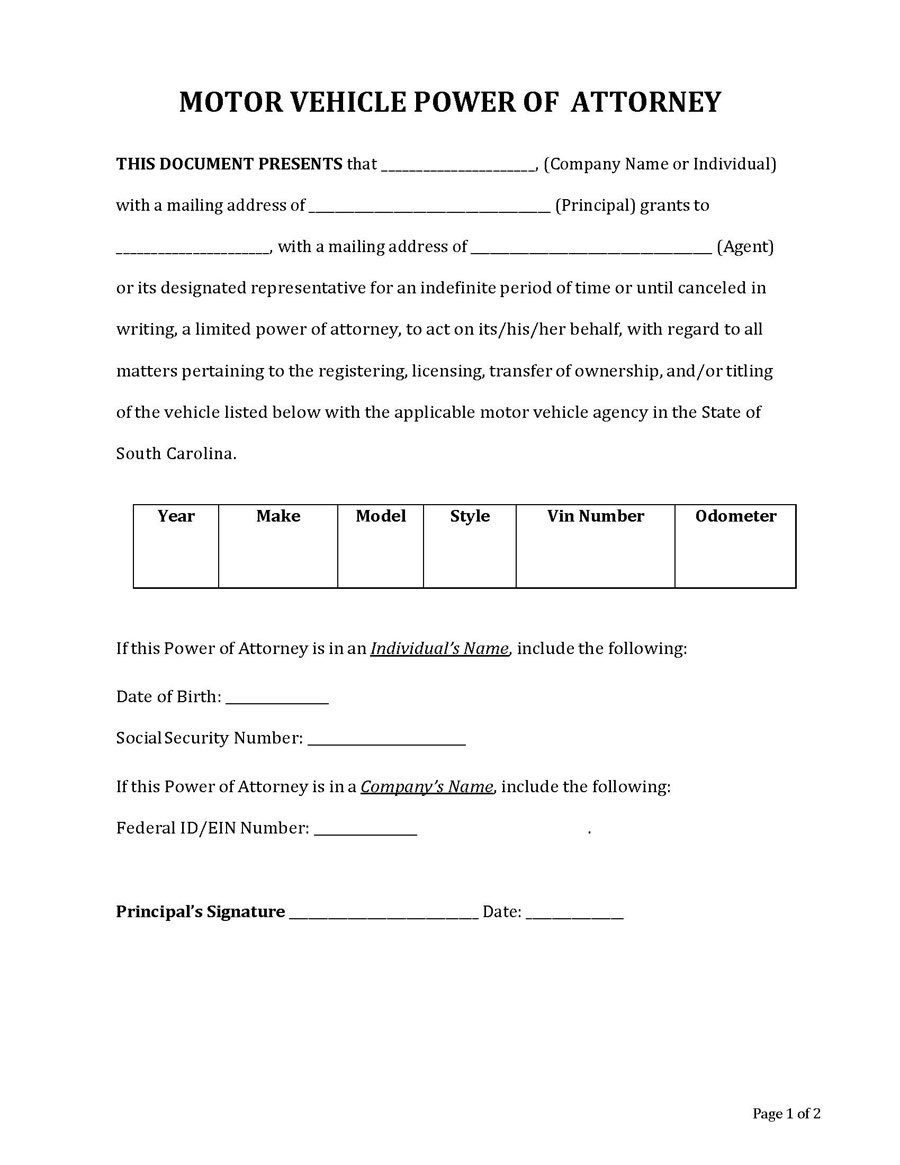
Vehicle Power of Attorney Form
Download: Microsoft Word (.docx)
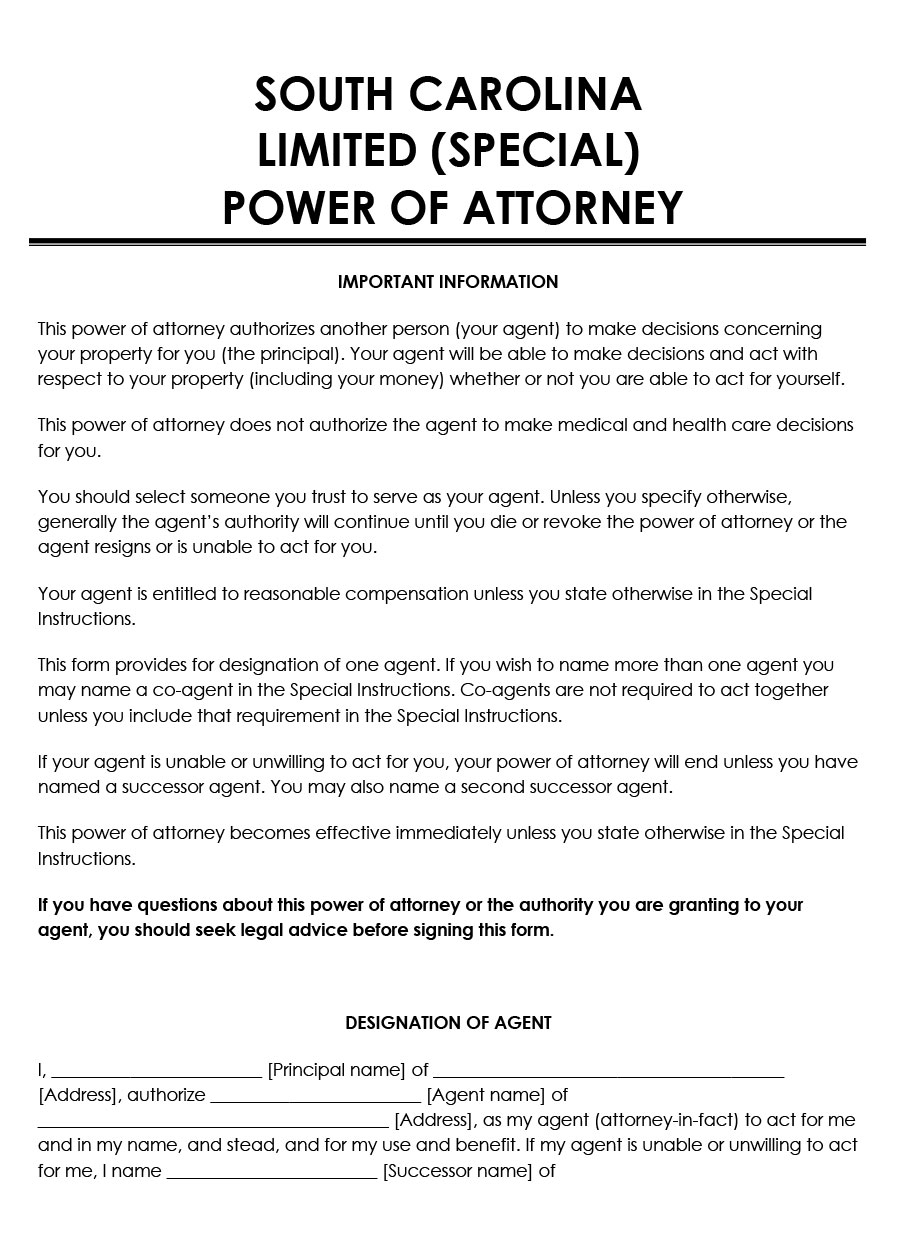
Limited Power of Attorney Form
Download: Microsoft Word (.docx)
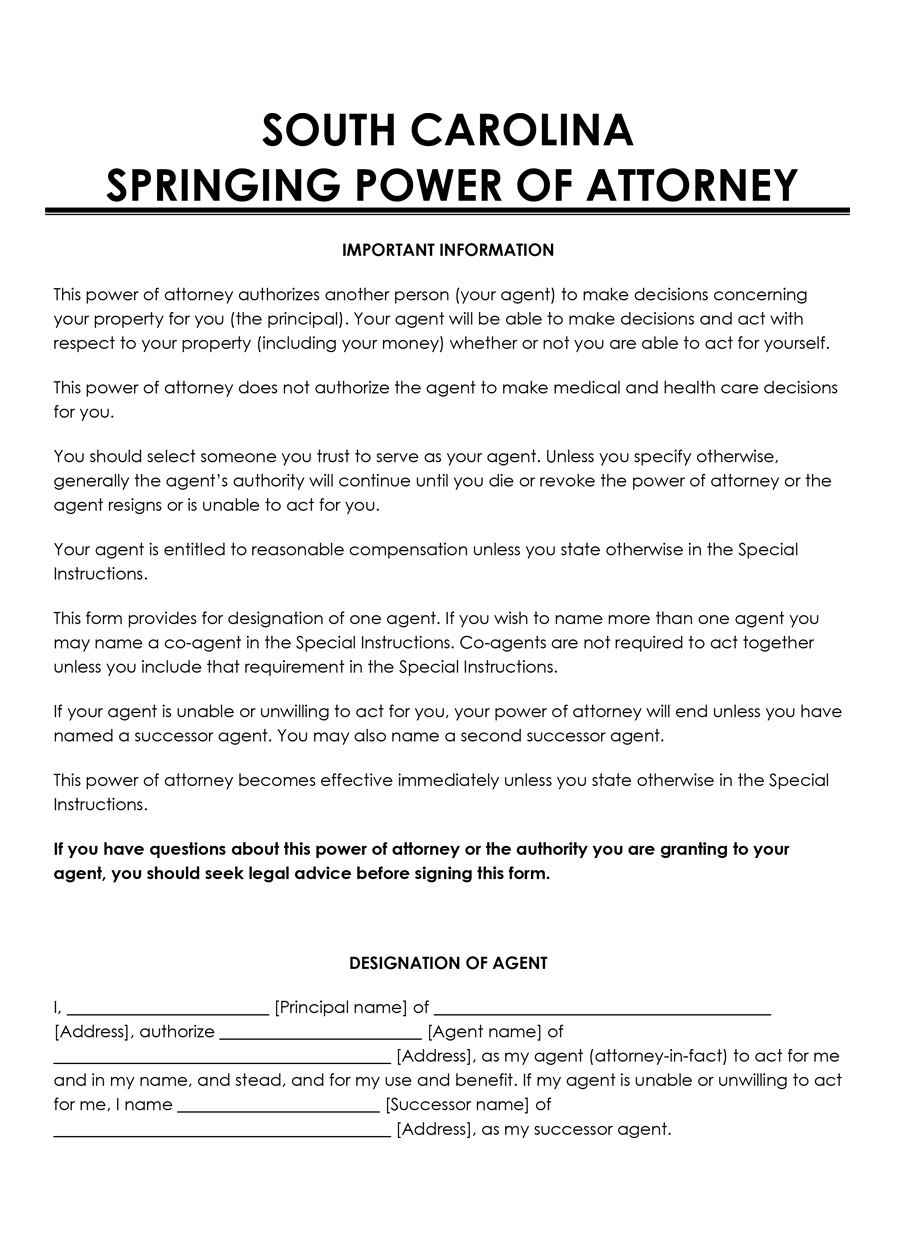
Springing Power of Attorney Form
Download: Microsoft Word (.docx)
Power of Attorney SC Requirements
You need to meet requirements when preparing a POA in South Carolina to ensure that it is valid. Ensure that it is in writing and includes your contact details and signature as the principal, the full name and contact details of your agent(s), the agreement date, specification of the powers granted, and details about when the authority given to the agent begins and ends. Also, ensure that the form is witnessed or notarized for proper approval and acknowledgment of the document.
Durable SC POA Requirements
There are requirements for preparing this type of form in SC. First, you need to keep in mind that in South Carolina, all forms are presumed to be durable by default. You should include a specific language to specify that it is not durable.
When creating it in SC, you must observe the relevant laws, including Title 62 Article 8 (South Carolina Uniform Power of Attorney Act) and § 62-8-104. In addition, ensure that you add your signature as the principal and have the form witnessed by at least two witnesses. Notarization is also required, and it can be done by the notary public or other recognized officials according to § 62-8-105.
Creating a POA
Although some states will require a principal to use the provided statutory POA form, there are no statutory document required in South Carolina State when creating it. Most of these states require a statutory form to ensure that you use the proper language required by the State laws. However, in South Carolina, you will have to state if it is durable; you have to specify if it will be revoked or not once you become disabled or incapacitated.
You can obtain it from websites and download it, fill it out, and sign it. A specific POA form will require notarization or require you to sign it before two witnesses to make them valid. Like the real estate POA forms, others will have to be recorded for validity purposes.
How to get it?
To get a South Carolina POA, the principal, and the agent will need to fill out and sign the form. Ensure that you observe the South Carolina Uniform Power of Attorney Act (§ 62-8) which guides setting up a durable power of attorney.
Steps to Fill Power of Attorney SC Form
You should follow the steps to fill it out in South Carolina. Here are the steps that you should observe:
Designate an agent
You will need to choose an individual you trust or a professional to be your agent. Since this is a legal document you want to prepare, ensure that you note down your name and the agent’s name alongside your addresses on the top part of the form.
Grant authority
The next step is to choose the powers you want to grant your agent and mark them so that your agent is clear about the kind of authority they will receive from you. You can assign your agent general or specific authority depending on your needs and requirements. You can also include extra instructions about how you want your agent to perform specific actions on your behalf.
Ensure form durability
If you wish for your POA to remain valid even after you become incapacitated, you need to make your form durable. However, in South Carolina, it is assumed to be durable unless you specify that it is non-durable.
Sign and date the form
The last step of filling it out in South Carolina includes a signature and the date. Both the principal and the agent will be required to do this. Ensure that you notarize it and include the signatures of the witnesses.
Storage and Usage of POA in South Carolina
Once you have completed it, you need to store it safely. Ensure that your agent and all other relevant parties have a copy of the form. For example, in South Carolina, a principal should give a copy of this form to a trusted family member or friend. You can also give a copy to third parties who require it, such as a landlord, state agency, or a bank.
When it comes to its usage and revocation, ensure you observe the following instructions:
Signing on behalf of the principal
An agent should be able to make decisions, conduct any legal matter they are authorized to, and sign on your behalf. You can make this easier by contacting the relevant parties and institutions to inform them about a power of attorney and provide your ID and your agent’s ID.
The agent will be able to sign on your behalf as shown below:
[Principal’s name]
by [agent’s name]
Power of attorney
Revoking a durable POA
You can revoke your POA at any time, and this is achieved by filling out and signing a revocation of power of attorney form. However, a durable POA cannot be revoked once you, as the principal, become incapacitated. Furthermore, in case of abuse, negligence, or failure to observe their fiduciary duty on the agent’s part, a third party can override this form in court.
Frequently Asked Questions
You can revoke it in South Carolina by using a revocation of POA document.
You can choose either to work or not work with an attorney when reviewing your South Carolina power of attorney. Working with attorneys or lawyers tends to be costly. However, you will not need them in most cases unless you have some legal concerns or questions you need to be clarified. This is because these forms are easy to understand and straightforward.
It needs to be notarized, witnessed, or recorded, depending on the form you are using. For instance, a durable POA form must be notarized, while a real estate one must be recorded. The best thing to do is to look up the requirements of every form as mentioned in South Carolina’s State laws.
When using an attorney, it may cost you $200 and $500 to get a power of attorney form in South Carolina.












